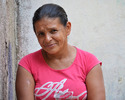Washington, D.C.—Today, the Washington Office on Latin America (WOLA), the International Drug Policy Consortium (IDPC), and the Center for Law, Justice and Society (Dejusticia) announce the launch of a new investigative website and photo essay to shed light on the human and societal cost of current drug policies in the Americas. The website, which highlights the efforts of a working group of international experts, provides up-to-date research and analysis on gender-related trends in drug policy and options for reform, while the photo essay shows the human cost these policies have on women in Latin America. The project includes experts from across the hemisphere, including Argentina, Brazil, Chile, Colombia, Costa Rica, Ecuador, Mexico, Puerto Rico, the United Kingdom, the United States, and Uruguay.
To visit the investigative website, please click here.
To view the photo essays, please click here.
Women across the Americas are being incarcerated for minor, non-violent, drug-related crimes at an alarming rate. In Argentina, Brazil, and Costa Rica, well over 60 percent of each country’s female prison population is incarcerated for drug-related crimes; in Ecuador, that number tops 80 percent. The vast majority of these women are not imprisoned for large-scale drug trafficking offenses, but rather for carrying out low-level, high-risk tasks.
The policies that have led to this surge in imprisonment have torn apart families and crippled women’s abilities to find decent, legal employment once they have been released, perpetuating a vicious cycle of desperation and incarceration.
“The devastating impacts of incarceration on these women, their families, and the communities in which they live point to the immediate need to reform drug laws that have served as a foundation for excessively harsh and disproportionate sentences against them,” said Rodrigo Uprimny, Executive Director of Dejusticia and a former member of Colombia’s Constitutional Court. “There is an urgent need to implement alternatives to incarceration for low-level, non-violent offenders, particularly those from the most vulnerable sectors of society.”
The international working group, comprised of government officials, lawyers, researchers, and advocates, will develop a guide that recommends strategies for public policy reform applicable to women incarcerated for drug offenses. These guidelines will serve to inform and advance policies that protect the rights of these women and help end the mass incarceration of non-violent drug offenders.
To complement this guide, WOLA has created a photo essay to show the human cost of current drug policies in the Americas. The photos tell the stories of four women, each providing a unique insight into the deeply troubling cycle of poverty, low-level involvement in the drug trade, imprisonment, and recidivism into which women are too often pushed.
“Current drug policies have filled the region’s prisons to bursting with low-level, non-violent offenders, while the heads of drug smuggling rings walk free,” said Coletta Youngers, WOLA Senior Fellow. Nischa Pieris added, “These stories paint a picture of vulnerability, desperation, and incarceration in the Americas. Although these particular narratives take place in Costa Rica, such stories are disturbingly common across the region.” Youngers and Pieris are co-coordinators of the project.
The narratives are based on interviews conducted with women who are or have been incarcerated in the Buen Pastor Prison in Costa Rica. Over 90 percent of the women incarcerated there have more than three children. Providing for those children while they are behind bars can prove difficult, if not impossible. Their stories were chosen because they are representative of the profiles often seen in women incarcerated across the hemisphere.
The International Drug Policy Consortium (IDPC), Dejusticia, and WOLA are working in collaboration with the OAS Inter-American Commission of Women, the Costa Rican Association for the Study and Intervention in Drugs (ACEID), and Corporación Humanas Colombia.
“This project aims to provide useful tools to policymakers seeking to promote more effective and humane policies for women incarcerated for low-level drug offenses,” said Marie Nougier, Senior Research and Communications Officer at IDPC. “We work to ensure that prison is used only as a last resort for vulnerable women involved in minor drug offenses, making use instead of interventions that seek to reduce the socio-economic and personal factors that led them to get involved in the drug trade in the first place.”
###
Contact:
Jessamine Bartley-Matthews
Communications Officer, WOLA
+1 (202) 797-2171
press@wola.org








